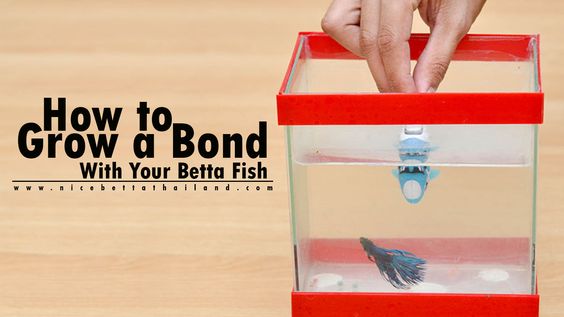Choosing and Caring for Your Betta
Let’s reviewed how to grow a bond with your betta fish
- Select a healthy betta. With proper care, betta fish regularly live for two-to-four years, and can occasionally reach ten years. Choosing a healthy fish and giving it proper care are your best chance for a lasting relationship.
- Most pet stores carry far more male than female bettas, because the former are more colorful and have larger fins. Whether you choose a male or female, look for a fish with a bright (not dull) color palate and healthy-looking, undamaged fins.
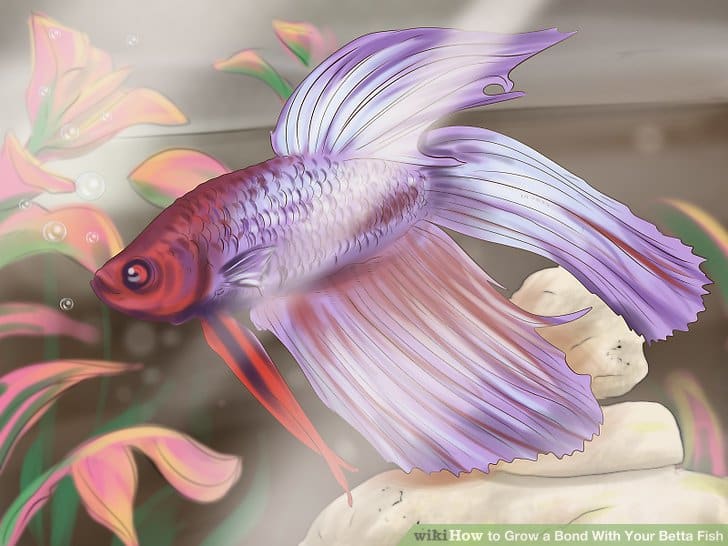
- You might assume you should select an active, excited fish as opposed to a more mellow one, but behavior in the pet store is not necessarily a harbinger of the betta’s personality. It may be worn out after a day of people tapping on the glass, after all.
- These and other selection tips, along with much more information on betta care, are provided in detail at How to Take Care of a Betta Fish.
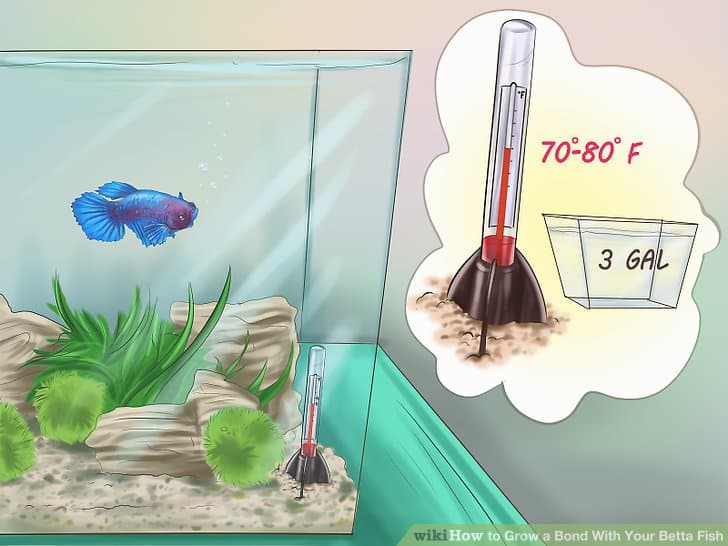
- Provide a proper home. You may have seen a betta in someone’s home or office swimming around in a vase or even a drinking glass. Because bettas often prefer to live alone, many people mistakenly assume that they don’t need or want much water to call home.
- You may hear people say that bettas like small spaces because their natural habitat is small puddles left by buffalo tracks in their native Southeast Asia. While bettas are sometimes found in such cozy bodies of water, this is more a testament to their resiliency during the dry season than an indication of their preferred lifestyle.
- In reality, bettas like quite a bit of space to roam, so you should select a tank that holds at least three gallons, and even up to ten. This may seem like a lot of tank for one small fish, but you’re more likely to have a happy and healthy betta this way.
- The tank should also be heated to between 76° and 80° F, and have a simple filter that does not churn up the water too much (bettas prefer still water). Keep the tank clean and change the water on a regular schedule.
- For more on tank preparation and maintenance, see How to Take Care Betta Fish.
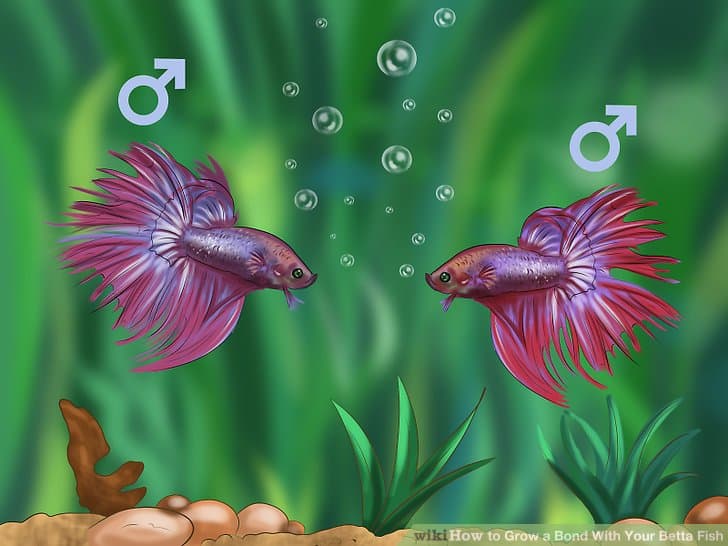
- Expect a loner. While some bettas don’t mind sharing a tank, many, especially males, become anxious, agitated, and aggressive when faced with other fish invading their space.
- While they have earned the name “fighting fish,” betta males are more interested in establishing dominance than harming each other. But injuries and general unpleasantness do often occur when two or more males, or really just a male betta and any other fish, are put in a tank together. So it is best to assume that your male betta will live alone.
A pair of female bettas will also not likely get along, but a larger group, up to around ten, can do well together. (This is called a “sorority” of bettas.) So allow your female to either swim solo or in a herd.
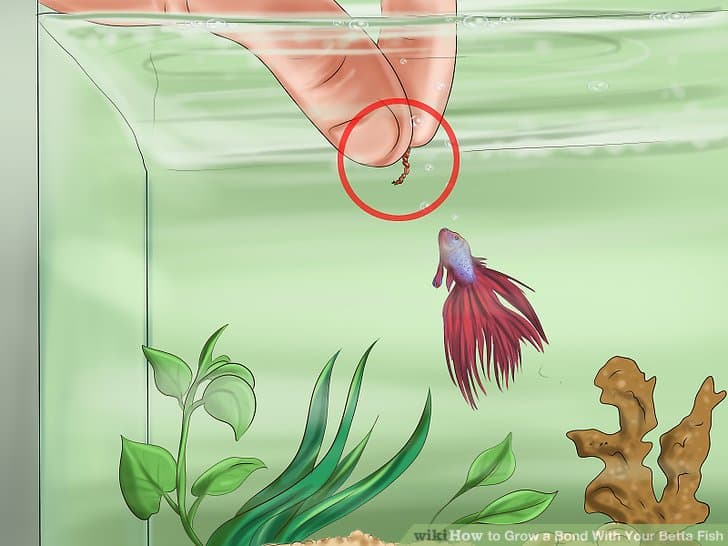
- Feed it properly. Betta fish generally do best with a fairly specific diet, consisting of three main foods: betta fish pellets, bloodworms, and baby brine shrimp (the latter two usually in freeze-dried form).
- Two feedings of three-to-four pellets (broken up if your fish is small) or six-to-seven bloodworms / shrimp should suffice. Bettas will overeat if given the chance, to the detriment of their health. They can also suffer from constipation (indicated by bloating), which some say can be alleviated by feeding the betta a single thawed, cut-up frozen pea.

- Discover more about your new friend’s species. Bettas are also known as Siamese fighting fish because they hail from Southeast Asia and males in particular are known to act aggressively towards each other.
Bettas are adaptable survivors. They populate the rice paddies of Southeast Asia and readily adjust to the cycles of floods and droughts.
Bettas are also one of the rare examples of a “labyrinth fish,” which means they can breathe oxygen from the air as well as from water. Thus, as long as they remain moist, they can survive out of water for short periods of time, and can live in small, brackish ponds (as are found during the dry season) for longer periods.
Bonding With Your Betta
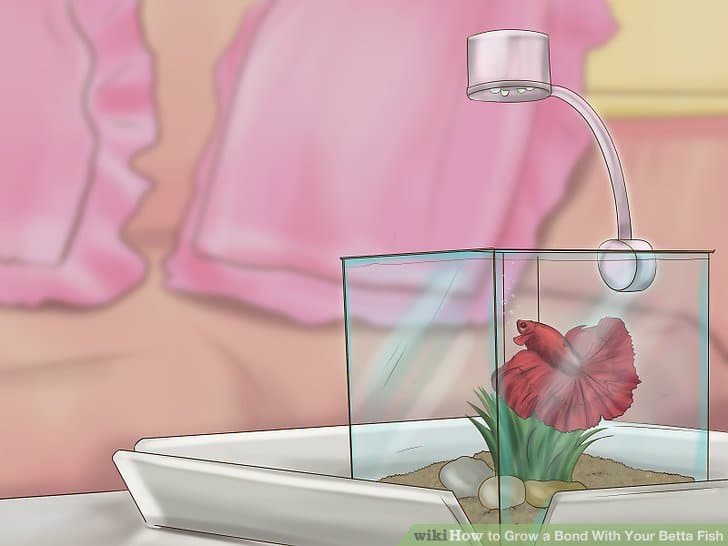
- Keep it in an active area. Bettas usually like to live alone, yet they also grow bored easily and much prefer to be near “where the action is” while retaining their own defined “turf.”
- Place your betta’s tank in a high-traffic, regularly-occupied part of the house, such as in the living room or near the kitchen. Bettas like movement and action, even when they are not being directly interacted with.
- Relocate the tank within the room occasionally, to provide the betta with a change of scenery. New things to see will attract his attention and keep him engaged and interested in your goings-on.
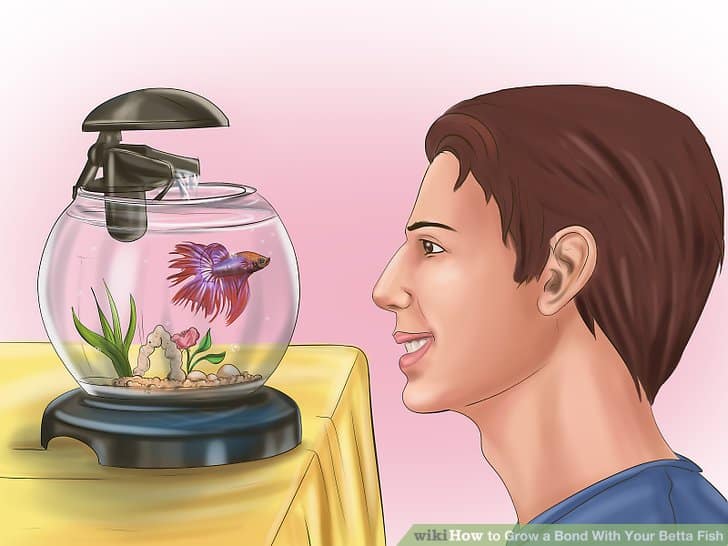
2. Name your betta, and talk to it. It’s hard to develop a bond with a nameless creature of any type, so find a name that suits your new little pal’s personality. Like the lists of baby names that populate the internet, you can also find suggestions for betta names if you need some help.
- Bettas are sensitive to the vibrations in water caused by sounds such as human voices, which some take as meaning your fish can learn to recognize your voice and its name. See if you can trigger a regular response by saying your betta’s name each time you visit.
- At very least, talking to your betta provides opportunities for interaction, which it craves, and helps establish the bond on your end. After all, who doesn’t want a good listener for a friend?
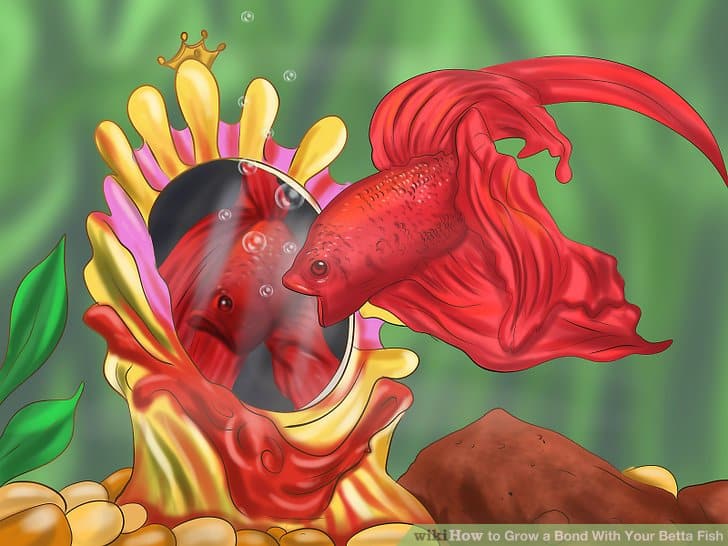
3. Give it visual stimulation. Relocating the tank, as noted, is one way to change up the scenery, but even just looking at your fish regularly gives it something new to focus on and eventually recognize.
- Male bettas are famous for “flaring” their fins — their response to encountering another betta — when seeing their reflection in a mirror. There is debate as to whether frequent “mirror flaring” is good (as stimulation) or bad (as stress) for your betta, so perhaps employ it in moderation or to stay safe don’t use a mirror. Keep in mind that some bettas can be timid and may be frightened at their own reflection.
- In addition to the occasional mirror (if desired), you can also doodle on the tank with dry erase markers or apply sticky notes cut into different shapes, or just simply place new and interesting objects just outside the tank.
- Watch your betta investigate and react to these new phenomena.
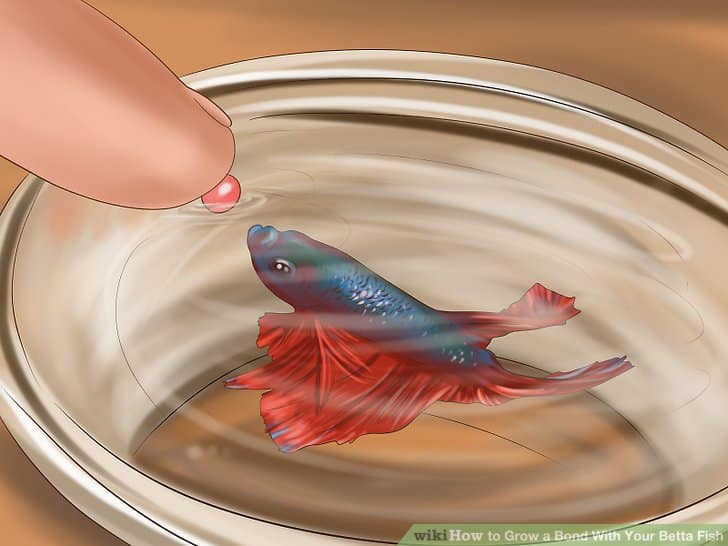
4. Play with your betta. While tapping a fish tank is a natural human reaction, some experts say to avoid this because it can cause an unhealthy shock to your unprepared betta. Rather, trace your finger along the glass and watch for the fish to react.
- Your betta will probably start coming over to your finger, and even following it as it slides along the tank wall. You might be able to get your fish to twist and loop in its pursuit.
- Bettas like coming to the surface, so bobbing toys and other objects can be a good idea for playtime as well. Floating ping-pong balls can be very fun — just make sure they’re clean first.
- Check out How to Play with Your Betta Fish for plenty more playtime ideas.
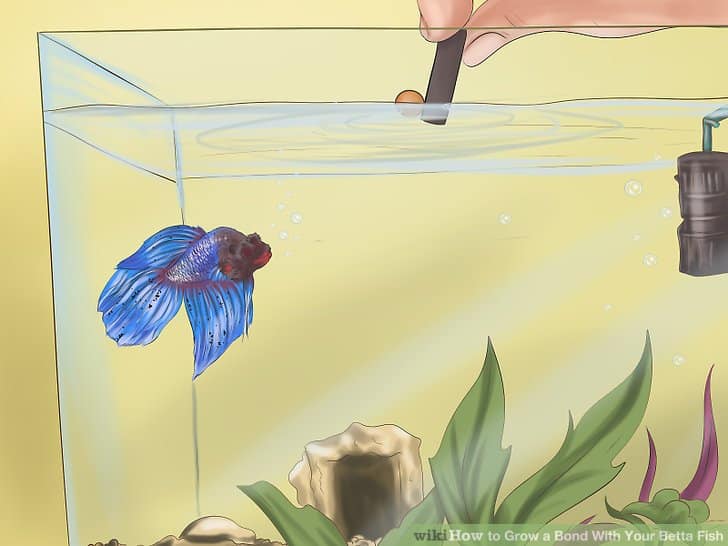
5. Train your betta. As with most animals, including people for that matter, the promise of a food treat can be powerful motivation for your betta to train. With some patience and practice, your fishy friend can learn some fun tricks.
You can teach your betta to eat from your fingers by placing your digits increasingly closer to the food pellets you place in the water, until the fish takes the food right from them. Your betta may even be able to leap out of the water to take food from your fingers.[10]
The lure of food can also teach bettas to swim, or sometimes even leap, through hoops (which you can fashion out of pipe cleaners, for instance). You might also, with practice, be able to teach your fish to push that ping-pong ball it plays with into a net.
How to Play with Your Betta Fish is also a good resource for training ideas and methods.
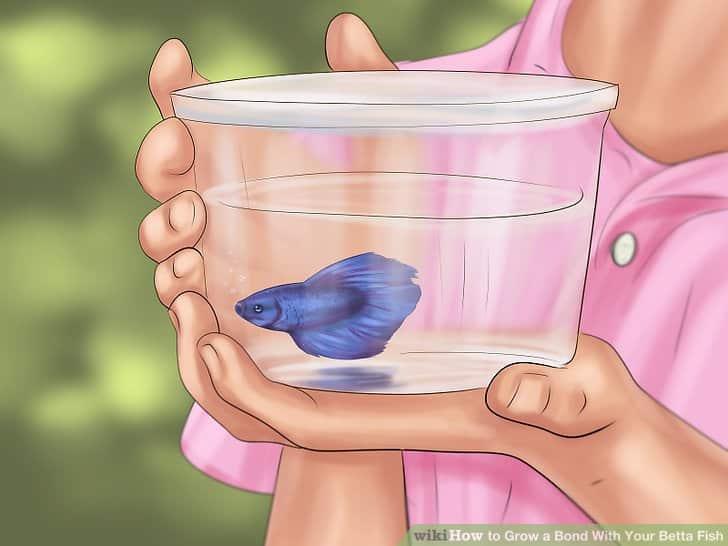
6. Be a friend. The best way to bond with a betta is to treat it like any other true friend. Visit when one or both of you is happy or sad, stressed out or flying high, healthy or sick. Growing a bond with any type of creature takes effort, patience, openness, and care.
How to Grow a Bond With Your Betta Fish
Bonding with a betta fish is not difficult if it starts with care and consistency. Owners should name the fish and talk to them often to get used to them, as fish can recognize their voices and respond to their owners. Feeding them twice a day in the right amount will help keep them healthy and associate their owners’ presence with good things. Place the tank in an area where people walk by to get the fish used to the movement around them, including changing the tank occasionally to stimulate learning. Owners can play with the fish by tapping their fingers on the glass to make them swim along, or add floating toys to keep the fish active. Training the fish with treats, such as jumping through hoops or eating from your hand, helps to build a positive relationship. The most important thing is patience and care. Caring for and communicating with the fish with love consistently will make the fish become a pet that is truly trustworthy and attached to its owner.
Looking for Rare betta fish?
If this article How to Grow a Bond With Your Betta Fish was useful to you You can leaving a 5-star reviews for It’s an encouragement. For us make encourage us in our research. Research information about betta fish for to present useful information further

Also we have group talk about betta fish for sale and share any new tip take care information on Web3 socialFi group

Right now we have betta fish doctor help every bettas lover by top breeder in Thailand to cure or share more tip on Animalverse social
If your bettas fish sick or need tip to treat help or join event prize with AVC Token
Let’s join the group many top breeder will help to answers in betta fish community
All of Betta Fish A Guide on Patterns, Color in the world
The most expensive betta fish in the world.
The most expensive betta fish in the world.


